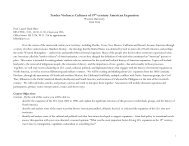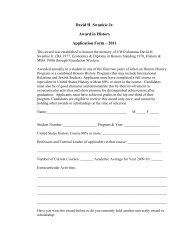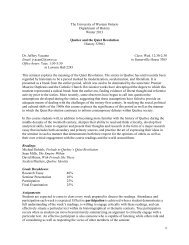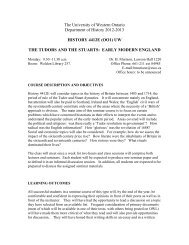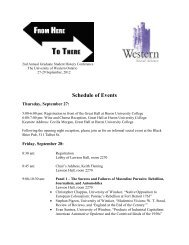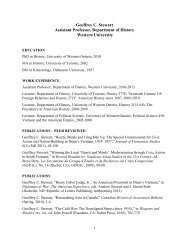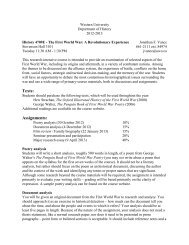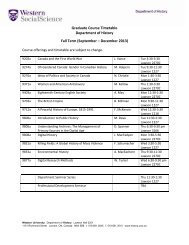Download - History - University of Western Ontario
Download - History - University of Western Ontario
Download - History - University of Western Ontario
Create successful ePaper yourself
Turn your PDF publications into a flip-book with our unique Google optimized e-Paper software.
THE UNIVERSITY OF WESTERN ONTARIO<br />
2012-2013<br />
DEPARTMENT OF HISTORY<br />
HISTORY 4207E<br />
CANADA AND THE AGE OF CONFLICT, 1896-1945<br />
Class time: Monday 11:30-1:30<br />
Instructor: Pr<strong>of</strong>essor Robert Wardhaugh<br />
Classroom: Weldon Library 257 Office: Lawson Hall 268<br />
Office Hours: Tues/Thurs 10:00 am-12:00 pm Telephone: 519-661-2111 (Ext. 84969)<br />
email: rwardhau@uwo.ca<br />
**********<br />
COURSE DESCRIPTION:<br />
“Modern” Canada was largely shaped between 1896 and 1945, decades that witnessed a massive<br />
immigration boom, two world wars, and an economic depression. Within this tumultuous era, this<br />
course will examine such issues as politics, regionalism, culture, gender, sexuality, modernity,<br />
class, race, ethnicity, religion, industrialization, urbanization, nationalism, foreign affairs, and<br />
age/generation.<br />
REQUIRED COURSE MATERIALS:<br />
Francis, Jones, Smith, and Wardhaugh, Destinies: Canadian <strong>History</strong> since Confederation, 7 th<br />
edition (2011)<br />
The reading materials consist <strong>of</strong> journal articles provided by the instructor.<br />
CLASSES:<br />
The classes are structured as seminars that follow a schedule listing the topics to be discussed and<br />
required readings. All students are expected to come to every seminar fully prepared by doing the<br />
readings. Each seminar consists <strong>of</strong> two student presentations on the readings by way <strong>of</strong> introduction to<br />
the topic, followed by general class discussion. The instructor will provide context when appropriate<br />
and guide the discussion. Student preparation and participation in the seminar process are essential to<br />
the overall success <strong>of</strong> the course.<br />
COURSE REQUIREMENTS:<br />
In order to obtain credit for the course, students are required to: 1) prepare, attend, and participate in all<br />
the seminars; 2) write one historiographical essay; 3) write one research essay; 3) make two in-class<br />
presentations on readings; 4) write a final exam.<br />
The following formula is used to determine overall grades: 1) participation- 20%; 2) historiographical<br />
essay- 20%; 3) research essay- 20%; 4) seminar presentations-20% (10% each); 4) final exam- 20%.
Participation:<br />
Value: 20%<br />
Date: Duration <strong>of</strong> Class<br />
Length: N/A<br />
Assignment: The relative weight given to participation demonstrates its importance to the success <strong>of</strong> a<br />
seminar format. Attendance, while being mandatory, is not enough to constitute marks for participation.<br />
Seminar Presentations:<br />
Value: 10% each<br />
Date: variable<br />
Length: 10-15 minutes<br />
Assignment: Topics and seminars for the presentations are chosen from the seminar schedule at the<br />
beginning <strong>of</strong> the course. All students must read the required works but those presenting will also<br />
produce an oral presentation that summarizes and analyzes the topic and readings, and sets the stage for<br />
seminar discussion.<br />
Research/ Historiographical Essays:<br />
Value: 20% each<br />
Date: Last week <strong>of</strong> term<br />
Length: 15-20 pages<br />
Assignment: In first term, students will examine the historiography <strong>of</strong> a topic in Canadian history<br />
(1896-1945) and write an essay that examines and analyses the relevant literature. In second term,<br />
students will write a standard major research paper. Students will come up their own topics emerging<br />
from the class content. All topics must be approved by the instructor.<br />
Final Exam:<br />
Date: TBA<br />
Value: 20%<br />
Assignment: The examination will contain a list <strong>of</strong> questions to be answered in essay form. There will<br />
be a choice <strong>of</strong> questions. The exam will cover the work <strong>of</strong> the entire course. Further details for all<br />
assignments will be announced in class.<br />
Further details for all assignments will be announced in class.<br />
There will be a penalty for late essays <strong>of</strong> one grade- NO EXCEPTIONS.<br />
Student evaluations in the form <strong>of</strong> corrected assignments will be returned by the voluntary withdrawal<br />
date.
LEARNING OUTCOMES:<br />
By the end <strong>of</strong> this course students will be able to:<br />
-Explain the various fields <strong>of</strong> Canadian history with a critical eye to the “grand nationalist narrative”<br />
that dominates the field<br />
-Employ such analytical paradigms as class, ethnicity, race, gender, sexuality, and culture<br />
-Read academic articles and chapters critically, seeking to identify main arguments and<br />
contributions<br />
-Offer succinct but analytical presentations on readings to their colleagues<br />
-Participate and engage in upper-year history seminar discussions<br />
-Understand the difference between a history and a historiographical essay<br />
Please note: A copy <strong>of</strong> the Faculty <strong>of</strong> Social Science policy on PLAGIARISM has been attached to<br />
this syllabus. Students who violate these guidelines can expect to incur the full weight <strong>of</strong> the<br />
penalties outlined therein. The <strong>University</strong> <strong>of</strong> <strong>Western</strong> <strong>Ontario</strong> uses s<strong>of</strong>tware for plagiarism checking.<br />
Students may be required to submit their written work in electronic form for plagiarism checking.
4<br />
SEMINAR SCHEDULE<br />
Seminar 1: Introduction and Assignments<br />
Seminar 2: Imperialism and Nationalism, 1896-1914<br />
Destinies, chapter 5<br />
Carman Miller, “English-Canadian Opposition to the South Africa War as seen through the<br />
Press” Canadian Historical Review 55:4 (1974) 422-438.<br />
Phillip Buckner, “Casting Daylight upon Magic: Deconstructing the Royal Tour <strong>of</strong> 1901 in<br />
Canada” The Journal <strong>of</strong> Imperial and Commonwealth <strong>History</strong>, 31, 2 (2003): 158-189.<br />
Patricia Dirks, “Canada’s Boys—An Imperial or National Asset? Response to Baden-Powell’s<br />
Boy Scout Movement in Pre-War Canada,” Philip Buckner and R. Douglas Francis, Canada and<br />
the British World: Culture, Migration, and Identity. Vancouver: UBC Press, 2006: 111-128.<br />
Seminar 3: Gender, 1896-1914<br />
Destinies, chapter 7<br />
Karen Bridget Murray, “Governing Unwed Mothers in Toronto at the Turn <strong>of</strong> the Twentieth<br />
Century” Canadian Historical Review, 85:2 (June 2004): 253-76.<br />
Cecilia Morgan, “<strong>History</strong>, Nation, and Empire: Gender and Southern <strong>Ontario</strong> Historical<br />
Societies, 1890-1920s” Canadian Historical Review, 82:3 (September 2001): 491-528.<br />
R. Blake Brown, “`Every boy ought to learn to shoot and to obey orders’: Guns, Boys, and the<br />
Law in English Canada from the late Nineteenth Century to the Great War,” Canadian Historical<br />
Review, 93:2 (June 2012): 196-226.<br />
Jeffrey Vacante, “Evolving Racial Identity and the Consolidation <strong>of</strong> Men's Authority in Early<br />
Twentieth-Century Quebec” Canadian Historical Review, 88:3 (September, 2007): 413-438.<br />
Seminar 4: First Nations, 1896-1914<br />
Destinies, chapters 2<br />
Sarah Carter, “Two Acres and a Cow: ‘Peasant’ Farming for the Indians <strong>of</strong> the Northwest, 1889-
5<br />
97,” Canadian Historical Review, 70:1 (March 1989): 27-52.<br />
Brenda McDougall, “Wahkootowin: Family and Cultural Identity in Northwestern Saskatchewan<br />
Metis” Canadian Historical Review, 87:3 (September, 2006): 431-62.<br />
Sarah Carter, “Categories and Terrains <strong>of</strong> Exclusion: Constructing the ‘Indian Woman’ in the<br />
Early Settlement Era in <strong>Western</strong> Canada,’ Great Plains Quarterly, 13 (Summer 1993): 147-61.<br />
Seminar 5: Industrialization, Labour, and Class, 1896-1911<br />
Destinies, chapters 6 & 7<br />
Greg Kealey, “Artisans Respond to Industrialism: Shoemakers, Shoe Factories and the Knights<br />
<strong>of</strong> St. Crispin in Toronto” CHA Historical Papers (1973) 137-58.<br />
Robert McIntosh, "Sweated Labour: Female Needleworkers in Industrializing Canada"<br />
Labour/Le Travail 32 (Fall 1993): 105-38.<br />
John Bullen, “Hidden Workers: Child Labour and the Family Economy in Late Nineteenth-<br />
Century Urban <strong>Ontario</strong>” Labour/Le Travail 18 (Fall 1986): 163-87.<br />
Seminar 6: Religion and Gender, 1896-1945<br />
Destinies, chapter 8<br />
Sharon Anne Cook, “Sowing Seed for the Master: The <strong>Ontario</strong> WCTU and Evangelical<br />
Feminism, 1874-1930” Journal <strong>of</strong> Canadian Studies 30 (3) (1995): 175-195.<br />
Marguerite Van Die, “Revisiting ‘Separate Spheres’: Women, Religion, and the Family in Mid-<br />
Victorian Brantford, <strong>Ontario</strong>” In Nancy Christie (ed.), Households <strong>of</strong> Faith: Family, Gender, and<br />
Community in Canada, 1760-1969. (Montreal: McGill-Queen’s <strong>University</strong> Press, 2002): 234-<br />
263.<br />
Nancy Christie, "Young Men and the Creation <strong>of</strong> Civic Christianity in Urban Methodist<br />
Churches, 1880-1914," Journal <strong>of</strong> the Canadian Historical Association / Revue de la Société<br />
historique du Canada, 17: 1 (2006), 79-105.<br />
Seminar 7: The West and the Immigration Boom, 1896-1911<br />
Destinies, chapter 3
6<br />
Howard Palmer, “Mosaic versus Melting Pot?: Immigration and Ethnicity in Canada and the<br />
United States” International Journal (1976), 488-528.<br />
Kenneth Sylvester, “Immigrant Parents, Ethnic Children, and Family Formation in the Early<br />
Prairie West” Canadian Historical Review, 84, 4 (December, 2003): 586-612.<br />
Lyle Dick, “Same-sex Intersections <strong>of</strong> the Prairie Settlement Era: The 1895 Case <strong>of</strong> Regina's<br />
‘Oscar Wilde’,” Histoire sociale/Social history, Volume 42, Number 83, (Mai-May 2009), 107-<br />
145<br />
Seminar 8: Education, 1896-1945<br />
Destinies, chapters 1&4<br />
Eric Sager, “Women Teachers in Canada, 1881–1901: Revisiting the ‘Feminization’ <strong>of</strong> an<br />
Occupation” Canadian Historical Review, 88, 2 (June 2007):<br />
Marilyn Barber, “Nation-Building in Saskatchewan: Teachers from the British Isles in<br />
Saskatchewan Rural Schools in the 1920s,” Philip Buckner and R. Douglas Francis, Canada and<br />
the British World: Culture, Migration, and Identity. Vancouver: UBC Press, 2006: 215-233.<br />
Seminar 9: Race and Ethnicity, 1896-1945<br />
Destinies, chapter 9<br />
Sarah Jane Mathieu, “North <strong>of</strong> the Colour Line: Sleeping Car Porters and the Battle Against Jim<br />
Crow on the Canadian Rails” Labour/Le Travail 47, (2001): 9-42.<br />
David Goutor, “Constructing the ‘Great Menace’: Canadian Labour's Opposition to Asian<br />
Immigration, 1880 – 1914” Canadian Historical Review, 88:4 (December, 2007): 549-76.<br />
Carla Marano, “‘Rising Strongly and Rapidly’: The Universal Negro Improvement Association<br />
in Canada, 1919–1940,” Canadian Historical Review, 91: 2 (June 2010), 233-259.<br />
Seminar 10: Sexuality, 1896-1945<br />
Destinies, chapter 8<br />
Angus McLaren, ‘Birth Control and Abortion in Canada, 1870-1920” Canadian Historical<br />
Review 59:3 (1978): 319-40.
7<br />
Steven Maynard, “'Horrible Temptations': Sex, Men, and Working-class Male Youth in Urban<br />
<strong>Ontario</strong>, 1890-1935” Canadian Historical Review 78:2 (June 1997): 191-136.<br />
Angus McLaren, “The Creation <strong>of</strong> a Haven for ‘Human Thoroughbreds’: The Sterilization <strong>of</strong> the<br />
Feeble-Minded and the Mentally Ill in British Columbia” Canadian Historical Review, 67:2 (1986):<br />
127-50.<br />
Suzann Buckley, Janice Dickin McGinnis, “Venereal Disease and Public Health Reform in Canada”<br />
Canadian Historical Review, 63:3 (1982): 337-54.<br />
Seminar 11: Leisure and Culture, 1896-1914<br />
Destinies, chapter 9<br />
Keith Walden, “Toronto Society's Response to Celebrity Performers, 1887–1914”<br />
Canadian Historical Review, 89:3 (September, 2008): 373-97.<br />
Craig Heron, “The Boys and Their Booze: Masculinities and Public Drinking in Working-class<br />
Hamilton, 1890-1946” Canadian Historical Review, 86, 3 (September, 2005): 411-52.<br />
Keith Walden, “Tea in Toronto and the Liberal Order, 1880–1914” Canadian Historical Review,<br />
93:1 (March 2012): 1-24.<br />
Morris Mott, “One Solution to the Urban Crisis: Manly Sports and Winnipeggers, 1900-1914”<br />
Urban <strong>History</strong> Review, 12 no. 2 (1983), 57-70.<br />
Seminar 12: Religion and Social Reform, 1896-1920<br />
Destinies, chapters 7 & 8<br />
Michael Gauvreau, “Factories and Foreigners: Church Life in Working-Class Neighbourhoods in<br />
Hamilton and Montreal, 1890-1930” In Michael Gauvreau and Ollivier Hubert, The Churches<br />
and Social Order in Nineteenth- and Twentieth-Century Canada (Montreal: McGill-Queen’s<br />
<strong>University</strong> Press, 2006): 225-273.<br />
Melissa Turkstra, "Constructing a Labour Gospel: Labour and Religion in Early 20th-century<br />
<strong>Ontario</strong>," Labour/Le Travail, 57 (Spring 2006), 93-130.<br />
Ernest Forbes, “Prohibition and the Social Gospel in Nova Scotia,” Acadiensis, 1 (1971): 11-36.
8<br />
Robert Wardhaugh, “The `Impartial Umpire’ Views the West: Mackenzie King and the Search<br />
for the New Jerusalem,’ Manitoba <strong>History</strong> (Spring 1995) 11-22.<br />
Seminar 13: World War One, 1914-1918: War, Memory, and Politics<br />
Destinies, chapter 10<br />
Tim Cook, “The Madman and the Butcher: Sir Sam Hughes, Sir Arthur Currie, and Their War <strong>of</strong><br />
Reputations” Canadian Historical Review, 85:4 (December, 2004): 693-719.<br />
Isitt, Benjamin, “Mutiny from Victoria to Vladivostok, December 1918” Canadian Historical<br />
Review, 87:2 (June, 2006): 223-64.<br />
Tim Cook, “"Anti-heroes <strong>of</strong> the Canadian Expeditionary Force," Journal <strong>of</strong> the Canadian<br />
Historical Association / Revue de la Société historique du Canada, 19: 1 (2008), 171-193.<br />
Jonathan F. Vance, “The Soldier as Novelist: Literature, <strong>History</strong>, and the Great War,” Canadian<br />
Literature, 79 (Winter 2003), 22-37.<br />
Seminar 14: World War One, 1914-1918: Class, Ethnicity and Gender<br />
Destinies, chapter 10<br />
Gregory S. Kealey, “State Repression <strong>of</strong> Labour and the Left in Canada, 1914-20: The Impact <strong>of</strong><br />
the First World War” Canadian Historical Review (Vol.73, No.3, 1992): 281-314.<br />
Linda J. Quiney, “’Bravely and Loyally They Answered the Call”: St. John Ambulance, the Red<br />
Cross, and the Patriotic Service <strong>of</strong> Canadian Women during the Great War” <strong>History</strong> <strong>of</strong><br />
Intellectual Culture 5 (2005): 1-19.<br />
Shauna Wilton, “Manitoba Women Nurturing the Nation: The Manitoba IODE and Maternal<br />
Nationalism, 1913-1920” Journal <strong>of</strong> Canadian Studies, 35 (2) (2000): 149-166.<br />
James W. St.G. Walker, “Race and Recruitment in World War I: Enlistment <strong>of</strong> Visible<br />
Minorities in the Canadian Expeditionary Force” Canadian Historical Review, 70:1 (March<br />
1989): 1-26<br />
Seminar 15: Labour and Class—The Winnipeg General Strike, 1919
9<br />
Destinies, chapter 11<br />
Craig Heron and Bryan D. Palmer, “Through the Prism <strong>of</strong> the Strike: Industrial Conflict in<br />
Southern <strong>Ontario</strong>, 1901-1914” Canadian Historical Review, 58, 4 (1977): 423-57.<br />
Benjamin Isitt, “Searching for Workers’ Solidarity: The One Big Union and the Victoria General<br />
Strike <strong>of</strong> 1919,” Labour/Le Travail, 60 (Fall 2007), 9-42.<br />
Tom Mitchell, "Legal Gentlemen Appointed by the Federal Government": the Canadian State,<br />
the Citizens' Committee <strong>of</strong> 1000, and Winnipeg's Seditious Conspiracy Trials <strong>of</strong> 1919-1920,"<br />
Labour/Le Travail, 53 (Spring 2004), 9-46.<br />
David Bright, “'We Are All Kin': Reconsidering Labour and Class in Calgary, 1919,” Labour/Le<br />
Travail, 29 (Spring 1992), 59-80.<br />
Seminar 16: Gender and the Law, 1911-1945<br />
Joan Sangster, “‘Pardon Tales’ from Magistrate's Court: Women, Crime, and the Court in<br />
Peterborough County, 1920–50” Canadian Historical Review, 74:2 (1993): 161-97.<br />
Karen Dubinsky and Franca Iacovetta, “Murder, Womanly Virtue, and Motherhood: The Case <strong>of</strong><br />
Angelina Napolitano, 1911–1922” Canadian Historical Review, 72:4 (1991): 505-31,<br />
Tamara Myers, “The Voluntary Delinquent: Parents, Daughters, and the Montreal Juvenile<br />
Delinquents' Court in 1918” Canadian Historical Review, 80, 2 (June, 1999): 242-68.<br />
Joan Sangster, “Criminalizing the Colonized: <strong>Ontario</strong> Native Women Confront the Criminal<br />
Justice System, 1920-60” Canadian Historical Review 80.1 (March 1999): 32–60.<br />
Seminar 17: Leisure and Culture, 1914-1945<br />
Destinies, chapter 9 &11<br />
Cynthia Commachio, “Dancing to Perdition: Adolescence and Leisure in Interwar Canada”<br />
Journal <strong>of</strong> Canadian Studies, 32 (3) (1997): 5-36.<br />
Sharon Wall, “Totem Poles, Teepees, and Token Traditions: 'Playing Indian' at <strong>Ontario</strong> Summer<br />
Camps, 1920-1955” Canadian Historical Review, 86:3 (September 2005): 513-44.<br />
Lynda Jessup, “Bushwackers in the Gallery: Antimodernism and the Group <strong>of</strong> Seven,” in Lynda
10<br />
Jessup, ed., Antimodernism and Artistic Expression: Policing the Boundaries <strong>of</strong> Modernity<br />
(Toronto: <strong>University</strong> <strong>of</strong> Toronto Press, 2001), 130-152.<br />
Seminar 18: Gender in the Roaring Twenties<br />
Destinies, chapter 11<br />
Jane Nicolas, “Gendering the Jubilee: Gender and Modernity in the Diamond Jubilee <strong>of</strong><br />
Confederation Celebrations, 1927” Canadian Historical Review, 90, 2 (June, 2009): 247-74.<br />
Veronica Strong-Boag, “The Girl <strong>of</strong> the New Day: Canadian Working Women in the 1920s”<br />
Labour/Le Travail Vol.4 1979: 131-64.<br />
Cynthia Commachio, “'A Postscript for Father': Defining a New Fatherhood in Interwar Canada”<br />
Canadian Historical Review, 78, 3 (September 1997): 478-511.<br />
Elise Chenier, “Class, Gender, and the Social Standard: The Montreal Junior League, 1912–<br />
1939,” Canadian Historical Review, 90: 4 (December 2009), 671-710.<br />
Seminar 19: Class and the Dirty Thirties<br />
Destinies, chapter 12<br />
Laurel Sefton MacDowell, “Relief Camp Workers in <strong>Ontario</strong>” Canadian Historical Review 76<br />
(2) (June 1995): 205-228.<br />
Ruth Roach Pierson, “Gender and the Unemployment Insurance Debates in Canada, 1934-1940”<br />
Labour/Le Travail 25 (Spring 1990): 77-103.<br />
Mary Vipond, “One Network or Two? French-Language Programming on the Canadian Radio<br />
Broadcasting Commission, 1932–36” Canadian Historical Review, 89, 3 (September, 2008):<br />
319-43.<br />
Seminar 20: Politics, 1930-1939<br />
Destinies, chapter 12<br />
Doug Owram, “Economic Thought in the 1930s: The Prelude to Keynesianism” Canadian<br />
Historical Review 66 (3) (September 1985): 344-377.<br />
C.P. Stacey, “The Divine Mission: Mackenzie King and Hitler”
11<br />
Canadian Historical Review, 61:4 (March 1980): 502-12<br />
Donald Forster and Colin Read, “The Politics <strong>of</strong> Opportunism: The New Deal Broadcasts”<br />
Canadian Historical Review, 60:3 (1979): 324-49.<br />
David R. Elliott, “Antithetical Elements in William Aberhart's Theology and Political Ideology”<br />
Canadian Historical Review, 59:1 (1978): 38-58.<br />
Sean Mills, “When Democratic Socialists Discovered Democracy: The League for Social<br />
Reconstruction Confronts the 'Quebec Problem'” Canadian Historical Review, 86:1 (2005): 53-<br />
81.<br />
Seminar 21: First Nations, 1914-1945<br />
Tina Loo, “Dan Cranmer’s Potlatch: Law as Coercion, Symbol, and Rhetoric in British<br />
Columbia, 1884-1951” Canadian Historical Review 73 (1992): 125-65.<br />
Robin Jarvis Brownlie, “‘A better citizen than lots <strong>of</strong> white men’: First Nations Enfranchisement<br />
- an <strong>Ontario</strong> Case Study, 1918-1940” Canadian Historical Review, 87:1 (March 2006): 543-56.<br />
Maureen K. Lux, “Care for the ‘Racially Careless’: Indian Hospitals in the Canadian West, 1920-<br />
1950s,” Canadian Historical Review, 91: 3 (September 2010), 407-434.<br />
Lesley Erickson, “Constructed and Contested Truths: Aboriginal Suicide, Law, and Colonialism<br />
in the Canadian West(s), 1823-1927” Canadian Historical Review, 86:4 (December 2005): 595-<br />
618.<br />
Seminar 22: The Environment, 1896-1945<br />
Alan MacEachern, “Lost in Shipping: Canadian National Parks and the International Donation <strong>of</strong><br />
Wildlife” In Alan MacEachern and William J Turkel, eds., Method and Meaning in Canadian<br />
Environmental <strong>History</strong> (Toronto: Nelson Education, 2009): 196-213.<br />
John Sandlos, “Not Wanted in the Boundary: The Expulsion <strong>of</strong> the Keeseekoowenin Ojibway<br />
Band from Riding Mountain National Park” Canadian Historical Review, 89:2 (June 2008): 189-<br />
221.<br />
Tina Loo, “Making a Modern Wilderness: Conserving Wildlife in Twentieth-Century Canada”<br />
Canadian Historical Review, 82:1 (March 2001): 92-121.
12<br />
Seminar 23: The North, 1896-1945<br />
Janice Cavell, “The Second Frontier: The North in English-Canadian Historical Writing”<br />
Canadian Historical Review, 83, 3 (September 2002): 364-89.<br />
Lyle Dick, “People and Animals in the Arctic: Mediating between Indigenous and <strong>Western</strong><br />
Knowledge” In Alan MacEachern and William J Turkel, eds., Method and Meaning in Canadian<br />
Environmental <strong>History</strong> (Toronto: Nelson Education, 2009): 76-101.<br />
Ken S. Coates, “The Sinews <strong>of</strong> their Lives: Native Access to Resources in the Yukon, 1890 to<br />
1950,” Ken Coates and Robin Fisher, Out <strong>of</strong> the Background: Readings on Canadian Native<br />
<strong>History</strong>. Toronto: Irwin Publishing, 1998: 196-209.<br />
Frank James Tester and Paule McNicoll, “A Voice <strong>of</strong> Presence: Inuit Contributions toward the<br />
Public Provision <strong>of</strong> Health Care in Canada, 1900–1930,” Histoire sociale/Social history, 41: 82<br />
(Novembre-November 2008), 535-561.<br />
Seminar 24: World War Two, 1939-1945<br />
Destinies, chapter 13<br />
Timothy Balzer, “‘In Case the Raid Is Unsuccessful …’: Selling Dieppe to Canadians” Canadian<br />
Historical Review, 78, 4 (December 1997): 409-30.<br />
Barry Ferguson and Robert Wardhaugh, “‘Impossible Conditions <strong>of</strong> Inequality’: John W. Dafoe, the<br />
Rowell-Sirois Royal Commission, and the Interpretation <strong>of</strong> Canadian Federalism” Canadian<br />
Historical Review, 84, 4 (December, 2003): 551-84.<br />
Robert H. Keyserlingk “‘Agents within the Gates’: The Search for Nazi Subversives in Canada<br />
during World War II” Canadian Historical Review, 66, 2 (1985): 211-38.<br />
W. Peter Ward, “British Columbia and the Japanese Evacuation” Canadian Historical Review<br />
vol. 3 (Sept. 1976): 289-308.<br />
Irving Abella and Harold Troper, ‘The line must be drawn somewhere’: Canada and Jewish<br />
Refugees, 1933–9” Canadian Historical Review, 60:2 (1979): 178-209.
If you or someone you know is experiencing distress, there are several resources here<br />
at <strong>Western</strong> to assist you. Please visit http://www.uwo.ca/uwocom/mentalhealth/ for<br />
more information on these resources and on mental health.<br />
Please contact the course instructor if you require material in an alternate format or if<br />
you require any other arrangements to make this course more accessible to you. You<br />
may also wish to contact Services for Students with Disabilities (SSD) at 661-2111 x<br />
82147 for any specific question regarding an accommodation.<br />
13<br />
THE UNIVERSITY OF WESTERN ONTARIO<br />
FACULTY OF SOCIAL SCIENCE<br />
PLAGIARISM<br />
Students must write their essays and assignments in their own words. Whenever students take<br />
an idea, or a passage from another author, they must acknowledge their debt both by using quotation<br />
marks where appropriate and by proper referencing such as footnotes or citations. Plagiarism is a<br />
major academic <strong>of</strong>fense (see Scholastic Offence Policy in the <strong>Western</strong> Academic Calendar).<br />
All required papers may be subject to submission for textual similarity review to the<br />
commercial plagiarism detection s<strong>of</strong>tware under license to the <strong>University</strong> for the detection <strong>of</strong><br />
plagiarism. All papers submitted will be included as source documents in the reference database for<br />
the purpose <strong>of</strong> detecting plagiarism <strong>of</strong> papers subsequently submitted to the system. Use <strong>of</strong> the service<br />
is subject to the licensing agreement, currently between The <strong>University</strong> <strong>of</strong> <strong>Western</strong> <strong>Ontario</strong> and<br />
Turnitin.com (http://www.turnitin.com).<br />
The following rules pertain to the acknowledgements necessary in academic papers.<br />
A. In using another writer's words, you must both place the words in quotation marks and<br />
acknowledge that the words are those <strong>of</strong> another writer.<br />
You are plagiarizing if you use a sequence <strong>of</strong> words, a sentence or a paragraph taken from<br />
other writers without acknowledging them to be theirs. Acknowledgement is indicated either<br />
by (1) mentioning the author and work from which the words are borrowed in the text <strong>of</strong> your<br />
paper; or by (2) placing a footnote number at the end <strong>of</strong> the quotation in your text, and<br />
including a correspondingly numbered footnote at the bottom <strong>of</strong> the page (or in a separate<br />
reference section at the end <strong>of</strong> your essay). This footnote should indicate author, title <strong>of</strong> the<br />
work, place and date <strong>of</strong> Publication and page number. Method (2) given above is usually<br />
preferable for academic essays because it provides the reader with more information about<br />
your sources and leaves your text uncluttered with parenthetical and tangential references. In<br />
either case words taken from another author must be enclosed in quotation marks or set <strong>of</strong>f<br />
from your text by single spacing and indentation in such a way that they cannot be mistaken<br />
for your own words. Note that you cannot avoid indicating quotation simply by changing a<br />
word or phrase in a sentence or paragraph which is not your own.
14<br />
B. In adopting other writer's ideas, you must acknowledge that they are theirs.<br />
You are plagiarizing if you adopt, summarize, or paraphrase other writers' trains <strong>of</strong> argument,<br />
ideas or sequences <strong>of</strong> ideas without acknowledging their authorship according to the method<br />
<strong>of</strong> acknowledgement given in 'At above. Since the words are your own, they need not be<br />
enclosed in quotation marks. Be certain, however, that the words you use are entirely your<br />
own; where you must use words or phrases from your source; these should be enclosed in<br />
quotation marks, as in 'A' above.<br />
Clearly, it is possible for you to formulate arguments or ideas independently <strong>of</strong> another writer<br />
who has expounded the same ideas, and whom you have not read. Where you got your ideas<br />
is the important consideration here. Do not be afraid to present an argument or idea without<br />
acknowledgement to another writer, if you have arrived at it entirely independently.<br />
Acknowledge it if you have derived it from a source outside your own thinking on the subject.<br />
In short, use <strong>of</strong> acknowledgements and, when necessary, quotation marks is necessary to<br />
distinguish clearly between what is yours and what is not. Since the rules have been explained<br />
to you, if you fail to make this distinction, your instructor very likely will do so for you, and<br />
they will be forced to regard your omission as intentional literary theft. Plagiarism is a serious<br />
<strong>of</strong>fence which may result in a student's receiving an 'F' in a course or, in extreme cases, in<br />
their suspension from the <strong>University</strong>.<br />
MEDICAL ACCOMMODATION<br />
The <strong>University</strong> recognizes that a student’s ability to meet his/her academic responsibilities may, on<br />
occasion, be impaired by medical illness. Please go to<br />
https://studentservices.uwo.ca/secure/medical_accommodations_link_for_OOR.pdf to read about the<br />
<strong>University</strong>’s policy on medical accommodation. Please go to<br />
http://www.uwo.ca/univsec/handbook/appeals/medicalform.pdf to download the necessary form. In<br />
the event <strong>of</strong> illness, you should contact Academic Counselling as soon as possible. The Academic<br />
Counsellors will determine, in consultation with the student, whether or not accommodation is<br />
warranted. They will subsequently contact the instructors in the relevant courses about the<br />
accommodation. Once a decision has been made about accommodation, the student should contact<br />
his/her instructors to determine a new due date for term tests, assignments, and exams.<br />
If you have any further questions or concerns please contact,<br />
Rebecca Dashford, Undergraduate Program Advisor, Department <strong>of</strong><br />
<strong>History</strong>, 519-661-2111 x84962 or rdashfo@uwo.ca



